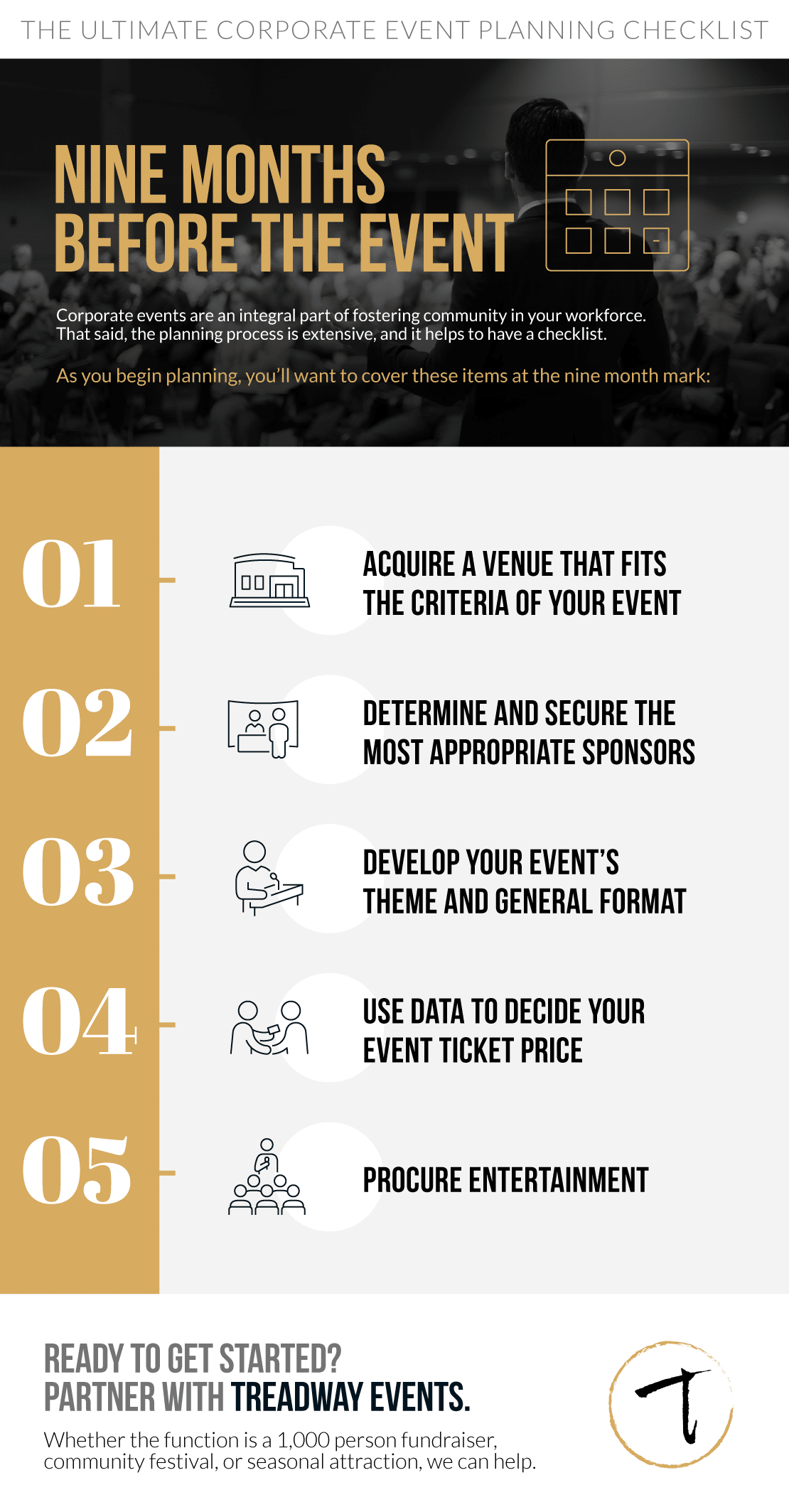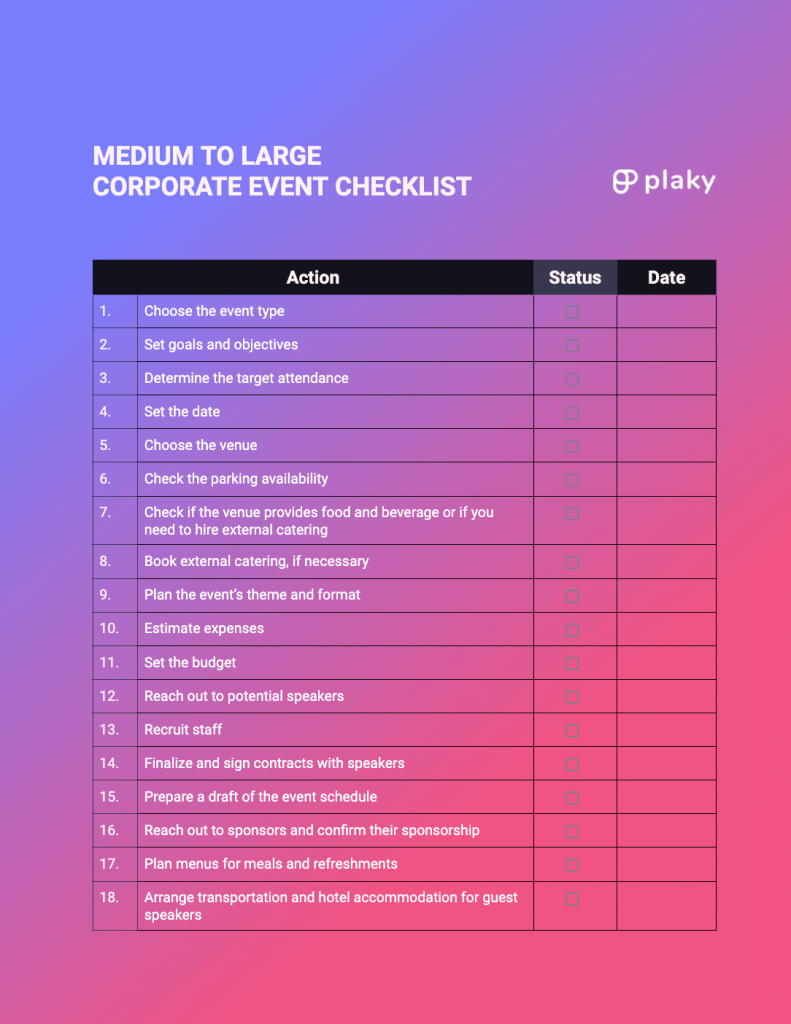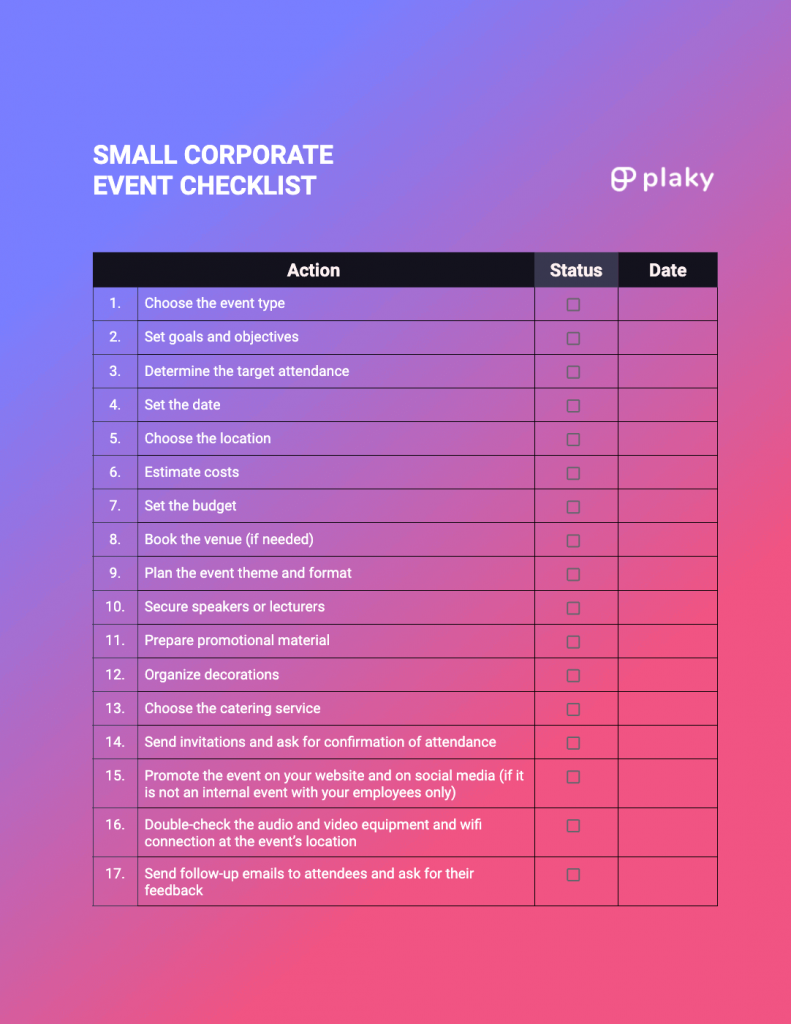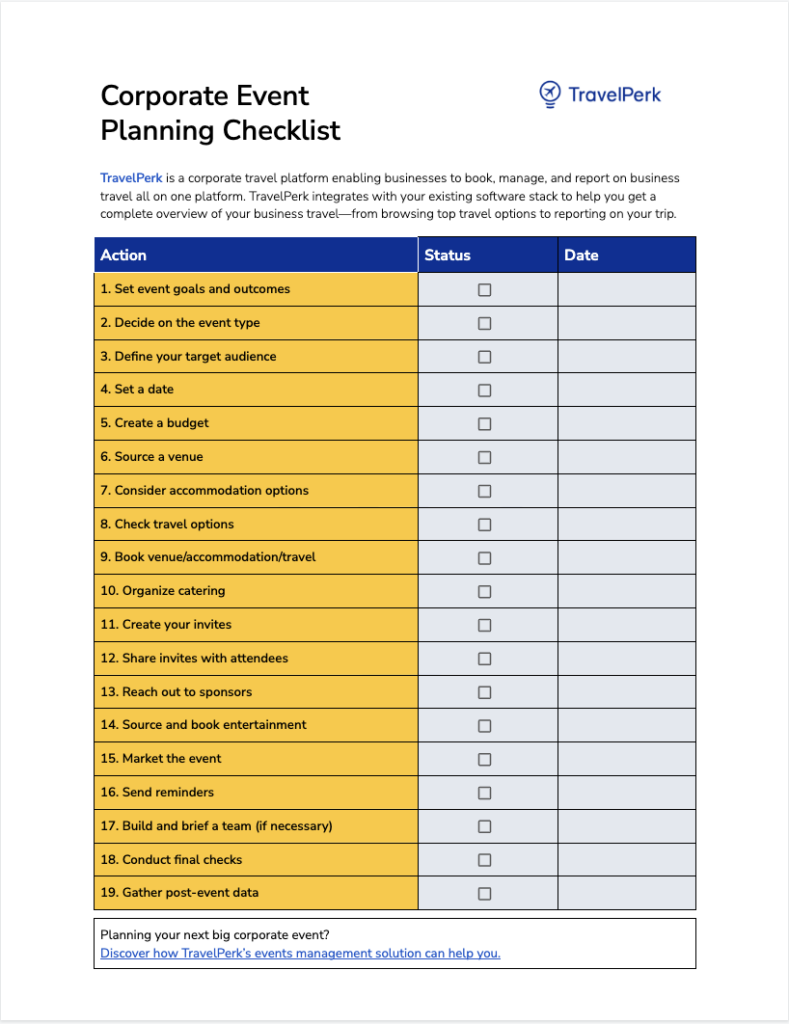Corporate Event Planning Checklist
When planning a corporate event, use a checklist to ensure everything is accounted for. We will discuss the essential items to include in your corporate event planning checklist.
From setting clear objectives and creating a budget to securing a venue and booking suppliers, a well-organized checklist will help you stay on track and achieve a successful event. We will also cover important considerations such as creating a timeline, marketing the event, managing registrations, coordinating logistics, and evaluating the event’s success.
By following this comprehensive checklist, you can navigate the event planning process with ease and confidence.
Choosing The Event Objective
When planning a corporate event, it’s crucial to choose the objective carefully. A well-defined objective sets the tone and purpose of the event, ensuring its success and effectiveness.
When it comes to planning a successful corporate event, one of the most important steps is choosing the event objective. This step sets the foundation for the entire planning process and determines the overall direction and purpose of your event. By identifying the purpose of the event and setting clear objectives and goals, you will be able to create an engaging and impactful experience for your attendees.
Identifying The Purpose Of The Event
To ensure the success of your corporate event, it is crucial to start by identifying the purpose of the event. Consider what you hope to achieve through this event and how it aligns with your company’s goals and values. Are you organizing this event to launch a new product, promote teamwork and collaboration among employees, foster relationships with clients, or simply to celebrate a milestone?
Table:
| Possible Event Purposes | Event Examples |
|---|---|
| Product launch | Unveiling a new software release |
| Employee engagement | Team building retreat |
| Client appreciation | An exclusive dinner for top clients |
| Company anniversary | Commemorating 10 years in business |
Once you have determined the purpose of your event, you will be able to tailor all the elements of your event planning checklist to align with this objective. This will ensure that every decision you make throughout the planning process contributes to the overall purpose of the event.
Setting Clear Objectives And Goals
In addition to identifying the purpose of your corporate event, it is essential to set clear objectives and goals. These objectives will outline what you hope to achieve during the event and provide a measurable benchmark for success. Avoid vague or generic goals, and make sure they are specific, measurable, achievable, relevant, and time-bound (SMART).
For example, if the purpose of your event is to launch a new product, your objectives could include:
- Generate a minimum of 100 qualified leads
- Obtain media coverage from at least three industry publications
- Increase brand awareness by 20% among target audience
Setting clear objectives and goals will not only help you stay focused during the planning process but also enable you to evaluate the success of your event once it is completed. By tracking and analyzing data related to your objectives, you can measure the return on investment (ROI) of your event and make informed decisions for future events.

Credit: treadwayevents.com
Planning The Event Logistics
Planning the event logistics is an essential part of corporate event planning. It involves managing details such as venue selection, transportation, accommodation, and catering to ensure a smooth and successful event.
Selecting The Event Date And Time
Choosing the perfect date and time for your corporate event is a critical step in the event planning process. Consider the availability of key participants and stakeholders, as well as any important industry conferences or holidays that may conflict with your desired date. It’s also important to take into account the season and weather conditions, as well as the time of day that works best for your event’s objectives. By selecting a date and time that aligns with your goals and caters to your target audience, you can maximize attendance and ensure the success of your event.Choosing The Venue And Location
Carefully selecting the right venue for your corporate event is crucial as it sets the tone and atmosphere for the entire experience. Begin by determining the capacity requirements to accommodate your expected number of guests. Consider the layout and facilities of the venue to ensure it aligns with your event activities and objectives. Furthermore, the venue’s location plays a significant role in accessibility and convenience for your attendees. Choose a venue that is easily reachable by public transportation, with sufficient parking if necessary. Evaluating the venue’s reputation, reviews, and past events held there can also provide valuable insights to make an informed decision.Arranging Accommodations And Transportation
To ensure a smooth and stress-free experience for your out-of-town attendees, arranging accommodations and transportation is essential. Consider partnering with nearby hotels to block rooms and negotiate discounted rates for your guests. Provide clear instructions and options for transportation to and from the event venue, including nearby airports or train stations. The convenience and comfort of your attendees should be a top priority, so be sure to offer alternative transportation options such as shuttles or car services if needed. By taking care of the logistics surrounding accommodations and transportation, you can enhance the overall experience of your corporate event.Developing A Budget
When it comes to corporate event planning, developing a budget is a crucial step to ensure a successful and cost-effective event. By having a well-planned budget in place, you can allocate funds effectively and avoid overspending. Here are some important considerations when developing your budget for a corporate event.
Assessing The Available Funds
Before diving into the details of your budget, it’s important to start by assessing the available funds. Determine the total amount you have to spend on the event. This will give you a clear understanding of how much you can allocate to different aspects of the event. It is recommended to leave some buffer amount for unforeseen expenses.
Allocating Expenses For Venue, Catering, And Entertainment
Once you have assessed the available funds, the next step is to allocate expenses for the major components of the event, such as the venue, catering, and entertainment. These three areas usually make up a significant portion of the event’s budget.
To ensure that you are making the most of your budget, consider the following:
- Venue: Research potential venues and their associated costs. Consider factors like location, capacity, availability, and amenities. Depending on your budget, you may have to make trade-offs between features and cost.
- Catering: Determine the type of food and beverages you want to provide and calculate the cost per person. Consider any dietary restrictions or preferences to provide a diverse menu. Be mindful of your budget while ensuring the quality of the catering service.
- Entertainment: Decide on the type of entertainment that aligns with the event’s purpose and target audience. Whether it’s a live band, a DJ, or a keynote speaker, factor in their fees and any additional production costs. Look for options that provide value for money.
By allocating a specific portion of your budget to each of these areas, you can effectively manage your expenses and ensure that you stay within your predetermined financial constraints.
Remember, developing a budget for corporate event planning requires careful consideration of available funds and the allocation of expenses. By following these steps and planning your budget strategically, you can organize a successful and memorable event without breaking the bank.
Creating A Timeline
When it comes to corporate event planning, organization is key. Creating a detailed timeline is essential to stay on track and ensure a successful event. This article will guide you through the process of creating a timeline for your corporate event, breaking down the planning process into manageable tasks and setting deadlines for each task. By adhering to this timeline, you will be able to effectively manage your event planning process and avoid any last-minute hiccups.
Breaking Down The Planning Process Into Manageable Tasks
Planning a corporate event can be overwhelming, especially if you don’t have a clear roadmap. Breaking down the planning process into manageable tasks is key to staying organized and ensuring that no detail is overlooked. To make it easier for yourself, create a comprehensive checklist of all the tasks that need to be completed for your event. This can include tasks such as selecting a venue, creating a budget, designing invitations, and arranging catering. By breaking down the planning process into smaller tasks, you can tackle them one by one and ensure that nothing falls through the cracks.
Setting Deadlines For Each Task
After breaking down the planning process into manageable tasks, it’s crucial to set clear deadlines for each task. Without deadlines, tasks may linger and cause unnecessary stress as the event date approaches. Start by prioritizing the tasks based on their importance and dependencies. Determine a realistic timeline for completing each task and stick to it. Consider factors such as venue availability, printing and shipping times, and coordination with vendors when setting deadlines. By setting deadlines and adhering to them, you can ensure that each task is completed in a timely manner, leaving you with enough time for proper coordination and troubleshooting.
| Task | Deadline |
|---|---|
| Secure a venue | 30 days before the event |
| Create a budget | 60 days before the event |
| Design invitations | 45 days before the event |
| Arrange catering | 30 days before the event |
| Hire entertainment | 60 days before the event |
By having a clear timeline with deadlines, you can track your progress and ensure that everything is on schedule. Remember to regularly review and update your timeline as needed to accommodate any changes or unforeseen circumstances. With a well-structured timeline in place, you can eliminate the stress of last-minute planning and confidently execute a successful corporate event.
Promoting The Event
Promoting your corporate event is crucial to its success. With the right marketing materials and strategies, as well as leveraging social media and online platforms, you can generate buzz and attract a larger audience. Let’s explore some effective ways to promote your event.
Creating Marketing Materials And Strategies
Creating appealing marketing materials is the first step in promoting your corporate event. Start by designing eye-catching flyers, posters, and digital banners that grab the attention of your target audience. Incorporate your brand colors and showcase key event details, such as the date, time, and location. Make sure to include a call-to-action that encourages potential attendees to register or RSVP.
Next, consider developing a compelling event website or landing page. This will serve as a centralized hub for all event information. Include a clear event description, agenda, and speaker profiles. Don’t forget to highlight any unique selling points or exclusive networking opportunities. Make it easy for attendees to register or purchase tickets directly from the website.
In addition to traditional marketing materials, consider implementing a digital marketing strategy. Use email marketing to send engaging newsletters and updates to your target audience. Personalize the emails and segment your contact list based on interests and preferences. Maximize the power of search engine optimization (SEO) by incorporating relevant keywords throughout your website and email content.
Leveraging Social Media And Online Platforms For Promotion
Social media platforms offer incredible opportunities to promote your corporate event to a wider audience. Create compelling social media posts that highlight key event details and benefits. Use hashtags relevant to your industry or event theme to increase visibility. Encourage your followers to share the posts and engage with your content.
Consider hosting live video sessions or webinars on platforms like Facebook or LinkedIn to provide a sneak peek into what attendees can expect. This interactive approach helps build anticipation and generates interest among your target audience. Collaborate with industry influencers or partners to further amplify your event’s reach.
Furthermore, leverage online event platforms like Eventbrite or Meetup. These platforms provide a convenient way for potential attendees to discover and register for your event. Be sure to optimize your event listing with relevant keywords and a compelling event description. Regularly update your event page with engaging content, such as speaker spotlights or behind-the-scenes sneak peeks.
Summary
Promoting your corporate event requires a strategic approach. By creating captivating marketing materials, utilizing digital marketing strategies, and leveraging social media and online platforms, you can effectively generate buzz and attract a larger audience. Remember to track your promotion efforts and make adjustments as necessary to ensure the success of your event.

Credit: plaky.com

Credit: plaky.com
Frequently Asked Questions For Corporate Event Planning Checklist
Q: How Do You Plan A Corporate Event?
A: Start by defining the event goals, create a budget, select a venue, and hire vendors.
Q: What Are The Key Elements Of A Successful Corporate Event?
A: A successful corporate event requires thorough planning, clear communication, attention to details, engaging activities, and excellent coordination.
Q: How Far In Advance Should You Plan A Corporate Event?
A: It is recommended to start planning a corporate event at least 4-6 months in advance to secure the best venues and vendors.
Conclusion
To summarize, organizing a successful corporate event requires meticulous planning and attention to detail. By following this comprehensive checklist, you can ensure that all aspects of the event, from budgeting and venue selection to logistics and marketing, are executed flawlessly.
Engaging with professional event planners, staying organized, and regularly communicating with all stakeholders will guarantee a smooth and memorable experience for your attendees. Remember, the success of your event lies in the careful implementation of each step outlined in this checklist.


